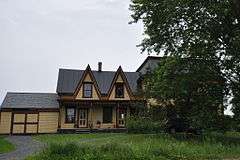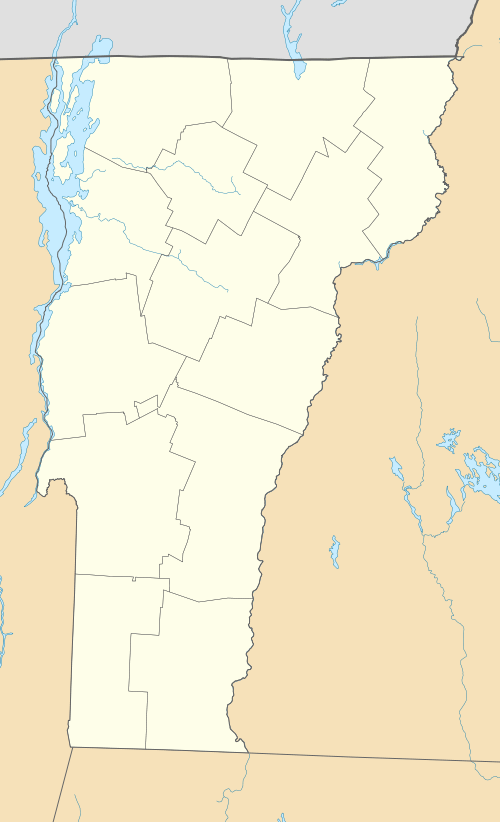Theodore Wood House
|
Theodore Wood House | |
 | |
  | |
| Location | 1420 Hollister Hill Rd., Marshfield, Vermont |
|---|---|
| Coordinates | 44°18′7″N 72°24′51″W / 44.30194°N 72.41417°WCoordinates: 44°18′7″N 72°24′51″W / 44.30194°N 72.41417°W |
| Area | 2 acres (0.81 ha) |
| Built | 1887 |
| Architect | Wood, Chester James |
| Architectural style | Second Empire |
| NRHP Reference # | 05000037[1] |
| Added to NRHP | February 10, 2005 |
The Theodore Wood House is a historic house at 1420 Hollister Hill Road in Marshfield, Vermont. Built about 1887, it is the only known surviving work of Chester James Wood, a local builder of some reputation, and is the town's only significant surviving example of Second Empire architecture. It was listed on the National Register of Historic Places in 2005.[1]
Description and history
The Theodore Wood House stands in a rural part of western Marshfield, on the north side of Hollister Hill Road, just west of Eaton Cemetery Road. It is a 2-1/2 story plank-framed structure, with its main block topped by a mansard roof, and a side gable-roofed ell. It is set on a granite foundation, and its walls are sheathed in wide wooden clapboards. The main block has a bracketed cornice and matchstick frieze. The formal entrance is sheltered by a broad single-bay porch, with chamfered square posts and a carved frieze and brackets. A second porch extends across the front of the ell, which features dormers with tall steeply pitched Gothic roofs. The interior of the house, like the exterior, features highly detailed fine quality woodwork.[2]
The house was built, probably in 1887, to a design by Chester Wood, and is the rural community's only significant example of Second Empire architecture. Wood, who was nineteen at the time, is known to have built a number of impressive buildings in Marshfield and other Vermont communities, of which none definitely attributable to him have survived except for this house. The interior woodwork was executed at least in part by Abie Wood, Chester's younger brother. The Wood family was relatively prosperous, but subsequent owners were not, and the house declined in condition with the fortunes of its owners, until it underwent a major restoration beginning in the 1980s. The effect of this ownership patterns meant that only relatively modest alterations (mainly for the introduction of plumbing and electricity) were made to the house during those years.[2]
See also
References
- 1 2 National Park Service (2010-07-09). "National Register Information System". National Register of Historic Places. National Park Service.
- 1 2 Christopher Bellamy (2004). "NRHP nomination for Theodore Wood House" (PDF). National Park Service. Retrieved 2016-11-28. with photos from 2004